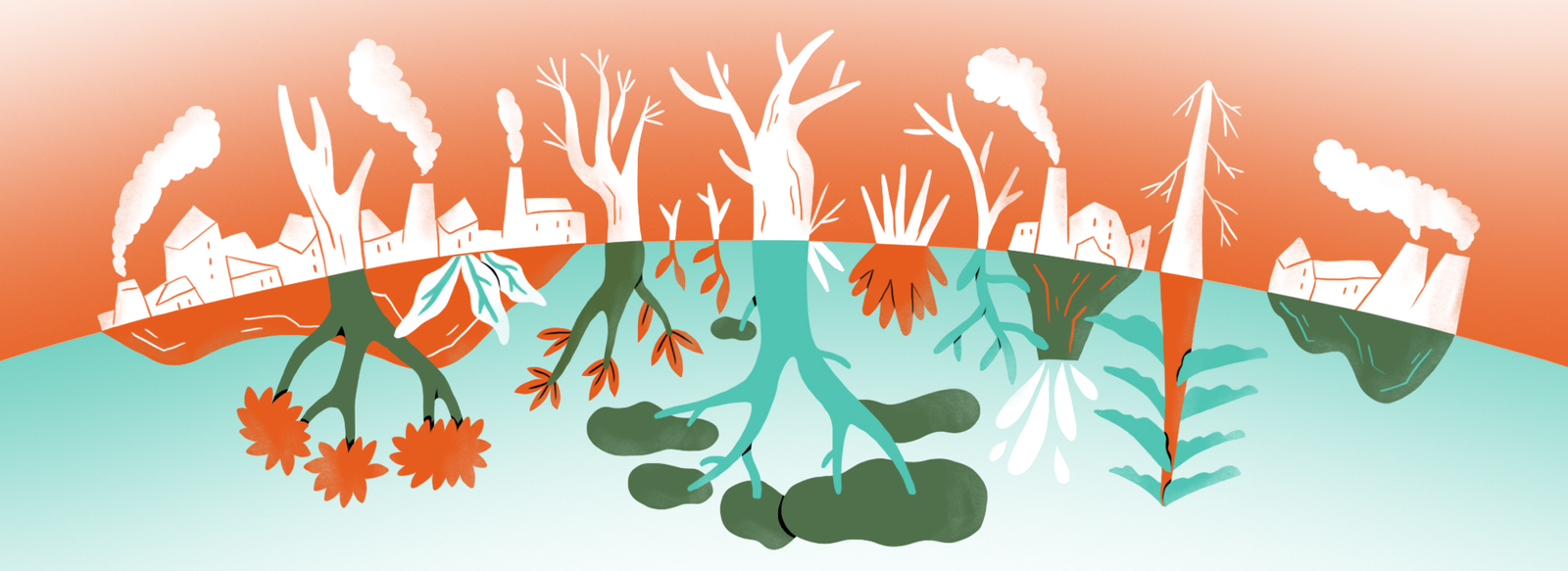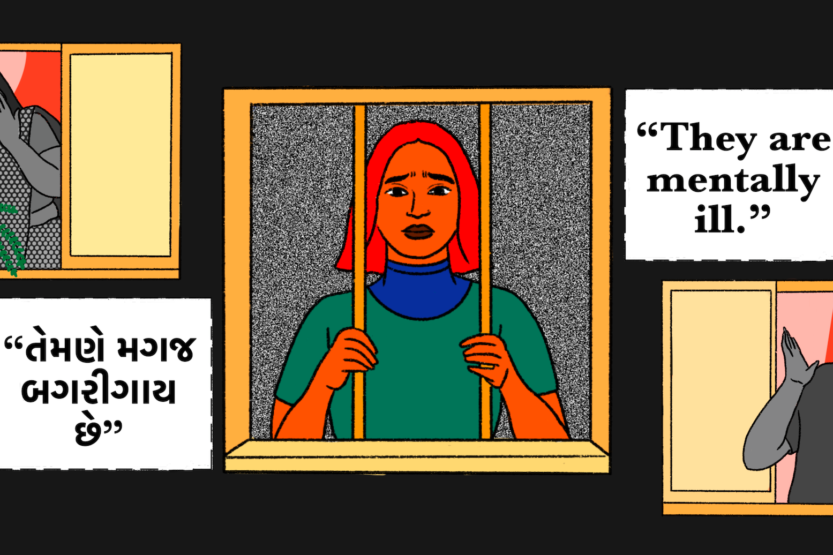I’ve recently been engaging in a lot of conversations on both postgrowth, “a way of seeing and being in the world that comes after the [economic] growth story“, and degrowth, the “downscaling of production and consumption that increases human well-being and enhances ecological conditions and equity.”
One thing that I’ve noticed is how often a debate develops over which word works better. The two words are often used interchangeably, even though there are some differences between them, so it is worth thinking about whether one word has the potential to appeal to more people.
To be clear : I support both movements and both are needed. I view postgrowth as including degrowth, and degrowth as helping lead to a postgrowth world. This essay is simply about which word we – climate activists, academics, writers, and anyone who wants things to be better – should be using most of the time, especially in public.
A crisis of crises
The environmental crisis forces us to question the way our societies are built. Within that crisis are multiple crises in one, and untangling all of them can often feel overwhelming.
At the same time, we still fear being perceived as ‘alarmists’ because decades of lobbying efforts have, with the complicity of large parts of the mediascape, normalised the denial of reality in a significant part of the population. As a result, we’ve tried to maintain a balance between screaming about how urgent our global crisis is versus not freaking people out. This ends up making us exhausted because it can feel like everyone else is gaslighting us while we all sleepwalk into incredibly grim realities.
The problem, however, isn’t really ‘alarmism’. We need people to be alarmed about the climate crisis because it is an alarming situation. It is an emergency, and it must require many more people to take it on for what it is. It requires drastic – by our current standards – changes. This is barely debatable at this point. We know that growth is a big part of that problem, hence why degrowth became a thing in the first place. The logic is fairly straightforward: on a finite planet, economic growth dependent on resource extractions is neither sustainable nor moral.
Industries aware of that have spent a lot of effort greenwashing that simple reality with terms like ‘green growth’ or ‘sustainable growth’. Very well-meaning people have also taken on the cause of ‘sustainability’ within the framework of growth. Up until relatively recently, I was among those very well-meaning people. There is something appealing about the term ‘sustainable growth’. We all want, broadly speaking, for things to be better tomorrow than today, and we are all equipped with a linguistic baggage that associates the word ‘growth’ with maturity, experience, and learning. Plants and children grow. Good parents and good schools leave you ‘room to grow’. The city I’m currently living in is ‘growing on me’. And so on. Growth has more positive connotations in the English language (and many others, as far as I can tell) than negative ones.
The problem however is that ‘sustainable growth’ is a misleading term. Even groups like the European Environment Agency are (slowly) acknowledging that ‘green growth’ is ‘unlikely’ and are calling for postgrowth and degrowth alternatives to be integrated into EU policy. The EEA called it ‘growth without economic growth’ which, incidentally, is in itself good evidence for how the word ‘growth’ maintains its appeal even when it has to be followed with without economic growth, which is what ‘growth’ is usually associated with in the first place.
The EEA writes:
“Economic growth is closely linked to increases in production, consumption and resource use and has detrimental effects on the natural environment and human health. It is unlikely that a long-lasting, absolute decoupling of economic growth from environmental pressures and impacts can be achieved at the global scale; therefore, societies need to rethink what is meant by growth and progress and their meaning for global sustainability.”
There’s already a word for that, and it’s postgrowth. One can only imagine the sort of limitations that a group like the EEA is under, the questions they must be asking themselves: ‘how can we talk about this problem given that it sits at the core of the economies of the institution we belong to?’ The sentence ‘growth without economic growth’ is pretty incredible when one thinks about it. It suggests that we need to work on dismantling the assumptions behind ‘economic growth’, namely that it is desirable or even possible on a finite planet.
The framework of ‘economic growth’ is so dominant that even those of us aware of its damage have to find ways to appeal to it. It’s like being forced to debate optimal seating arrangements on the Titanic, only worse, because ‘economic growth’ affects us all. It’s like seeing the iceberg with your own eyes while being forced to debate its presence because your entire economical and political systems rely on pretending that it is not there. Only this time there are no lifeboats. This is the only planet that most of us will ever know, despite the latest fanfare behind the billionaire space race/dick measuring contest.
Another report, by Heinrich-Böll-Stiftung and the Konzeptwerk Neue Ökonomie, is more straightforward. They called it a Societal Transformation Scenario (STS). Here’s part of the abstract: ‘To stop climate change, we have to limit global warming to 1.5°C. […] One important yardstick emerging from it was the need for global emissions to reach net-zero by 2050, the Intergovernmental Panel on Climate Change (IPCC) says in its «Special Report on Global Warming to 1.5°C». One important problem with this and other scenarios is that virtually all rely on continued global economic growth.’’
They then proceed with a 100 page explanation of that problem and proposing an STS instead. The value of such studies, however, is in their potential to affect change in our societies, and their potential needs to be (incoming pun) left to grow. There will always be aspects of our world that requires us to ‘grow’ – medicine, as an obvious example, or education, or care work, and hundreds of more examples – but this cannot be done within the framework of seeking to ‘decouple’ economic growth from “environmental pressures and impacts”, which is a euphemism for environmental disasters. Today, there are hundreds of scenarios put forward by scientists, researchers, indigenous thinkers, activists and others, and there will undoubtedly be hundreds more in the years to come.
The problem then isn’t just economic growth as we know it today, but the fact that the word ‘growth’ gives this extremely damaging phenomenon a linguistic way out. It provides a kind of false bargain. ‘Yes, there will be some costs (environmental disasters) but we promise that you will one day benefit from it. It will protect you.’ Our rational brains may know that this isn’t so, but we are also emotional creatures and we will seek a sense of security where we can find it.
So how do we fight words that are so easily weaponised? With words that can disarm them.

Postgrowth vs Degrowth
Degrowth and postgrowth are both movements that are rich, and that are continually being enriched, with fairly feasible solutions. There will always be nuances to be applied, like whether something applicable in one place is also applicable in another. There will be priorities that have to be decided on the ground. There will be a lot of room to grow (again, excuse the pun).
The Post Growth Institute, writing in degrowth.info, argues that “the main difference between post-growth and degrowth largely relates to framing” and acknowledges that “economic degrowth does need to occur”. In their view, postgrowth focuses “on what’s already working, rather than focusing on what is not”, implying that degrowth does the opposite.
Subscribe to shado's weekly newsletter
Exclusive event news, job and creative opportunities, first access to tickets and – just in case you missed them – our picks of the week, from inside shado and out.

That may be true, but the case for using postgrowth is even simpler: it feels better. And this matters a lot.
We know now that how words make us feel influence our perception of them. I think a lot of academics and activists are still in denial of this because, despite our best intentions, we are still vulnerable to the myth of homo economicus and ‘perfect rationality’. We don’t want to admit that we are all capable of ignoring the facts if they make us feel too uncomfortable or scared. We don’t want to fully acknowledge the consequences of things like shifting baseline syndromes, even as almost all of us have already shifted our baselines. It would be impossible to live in the 21st century otherwise.
And when we do see our societies do irrational things like, say, a Brexit or a Trump or an Orban or a Bolsonaro or a Modi or an Erdogan, we often go back to doom-and-glooming the future. We find ourselves in very cynical and depressive states of mind. How can people have such priorities as petty nationalistic concerns when our world is quite literally on fire? Well, I’m not saying this isn’t a worthwhile question, but I think what needs to be asked in addition to that is: how can we make it more difficult for the forces of destruction to operate, and how can we make it easier to get more people on board the various societal transformation scenarios like the aforementioned STS?
Although by no means the only one, one tool at our disposal is language. The power of Black Lives Matter (BLM) and of #MeToo at least partly draws on that. BLM forces us to ask ‘why don’t Black lives matter in our societies?’ and ‘how can all lives matter when Black lives don’t?’ BLM has proven not just effective in the US but around the world. We’ve seen Palestinians say Palestinian Lives Matter in Israel-Palestine while other Palestinians use BLM to draw on the specific struggles of Afro-Palestinians. As for #MeToo, the ‘too’ allowed for countless of (mostly) women to join the chorus created by those who had already spoken out. It allowed a sense of we-are-all-in-this-together-ness whose global implications are unmatched by anything else in history, capable of affecting roughly half of the world’s population and, through that very fact, the other half as well. In a world still very much impacted by both BLM and #MeToo, we should no longer underestimate the power of symbols and language.
The climate movement intersects with virtually every other cause and struggle. For that reason, I believe that other causes can benefit from moving beyond the rigid paradigm of ‘growth’ and into postgrowth. Postgrowth is an inclusive term. It is a vision which seeks to move beyond growth, and we are all invited to this new world. We should be alarmed by what’s happening, but this doesn’t mean that there is nothing on the horizon for us to work towards. This is why I promote Solarpunk as well. We need to be telling better stories of our present and our future if we wish to make it easier for everyone to join us in this existential struggle.
As a term, ‘degrowth’ can lead us to largely emotional debates about ‘who needs to do it first’. We’re already seeing this happening even within the context of the framework of ‘sustainable growth’ which continues to dominate debates about the climate crisis. Governments and corporations easily appeal to the usual “why us? Why not them? Surely China needs to do it first.” I know many think this is ridiculous what-about-ism, but ridiculous what-about-ism is a significant component of our politics worldwide today, and we can’t just wish it away. We don’t have time. We need the best words to help us frame the climate crisis as quickly as possible.
By advocating for postgrowth, we put major polluters in a more defensive position. They will have to come up with reasons why they oppose an obviously better vision of the world. They do not have the tools at their disposal to tackle this because doing so requires dismantling their own business models, and they will never do that unless they have no other choice.
They are fine with hijacking the word ‘sustainable’, and have made such a mess of it as to effectively render it almost completely meaningless. BP and Shell and co are all very pleased with the word sustainable, and I think they will be equally pleased if the main word opposing their destructive practices starts with the negative ‘de’, as in degrowth. They can simply use it to their advantage by saying that ‘unlike those environmentalists, we want everyone to benefit from growth.’
We cannot win that ‘debate’ because it is rigged against the facts. It is entirely predicated on the belief – which is false, but that doesn’t matter in practice – that ‘I’ have to sacrifice my well-being for something that will remain abstract for most, despite the catastrophes already being caused by climate change, for a very long time.
I don’t see these corporations and the governments subsidising them having the same kind of responses to a popularisation of postgrowth as a broad umbrella term encompassing a more inclusive vision of the world. They would be forced into a position where they have to oppose the future because they’re so busy destroying the present.
Greenwashing would no longer be as easy because postgrowth already includes the we-are-all-in-this-together-ness that these corporations and governments promote as a false alternative to ‘climate alarmists who whine about flying less and not eating meat.’ They thrive on us already feeling guilty about what ‘we’ are doing, even as it is mostly them doing it. They make ‘us’ complicit in destroying our world, giving us the incredibly cynical ‘option’ of ‘choosing’ between jobs and our environment.
They cannot do that with ‘postgrowth’ but they can do that with ‘degrowth’, and we don’t have time to let them try. As the EEA kinda acknowledges and the STS makes clear, we have to explore both postgrowth and degrowth alternatives wherever they are more relevant. There is and will be room for both postgrowth and degrowth to grow (annoying pun intended again) as movements, practices and policies, but in order to do that we must make sure we are the ones framing the ‘debates’. We can no longer let polluting corporations and the governments subsidising them decide the terms of such ‘debates’.















